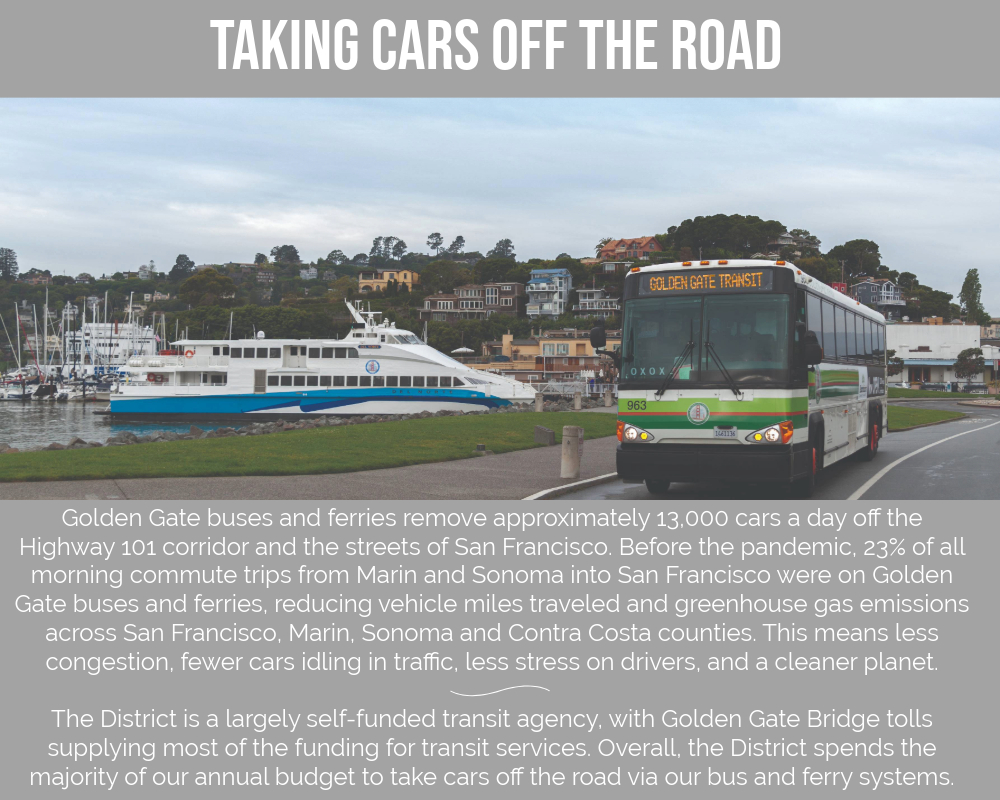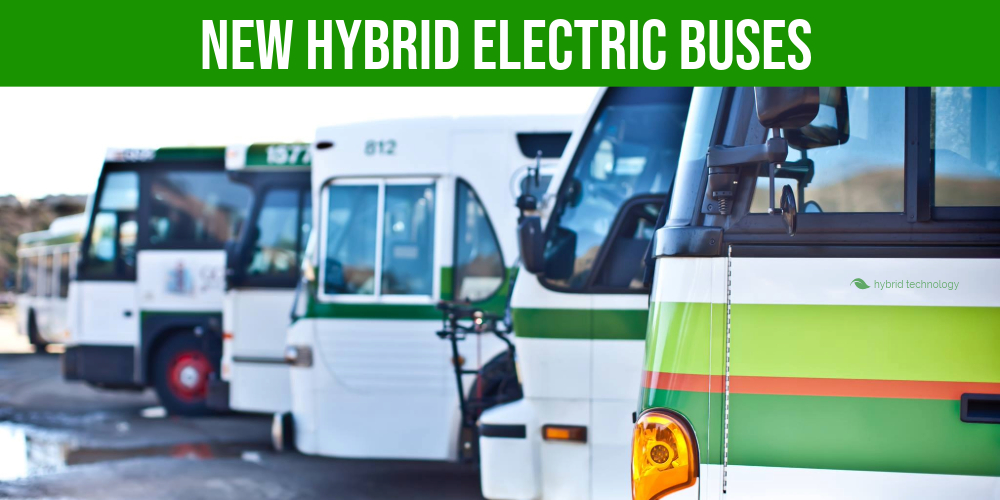The Golden Gate Bridge, Highway & Transportation District (District) is proud to have a sustained record of implementing climate-friendly practices and programs.
For years, the District has been active in emissions-reduction programs across its Bus, Bridge, and Ferry divisions and has pioneered efforts as an early adopter and active partner of zero emissions and renewable fuel programs.
In 2019, the Board of Directors adopted its first-ever climate emergency resolution which reestablished the District's principles regarding the causes and impacts of global climate change and renewed its commitment to continue expanding, wherever feasible, efforts to reduce greenhouse gas emissions and plan for a resilient future. The resolution solidifies the District as one of the first Bay Area transportation agencies to adopt such a policy, and further aligns it with many Bay Area cities and counties that have adopted similar resolutions.
In May 2024, the District Board of Directors adopted a new strategic plan that further outlines the goals and strategies the District will employ to achieve its climate sustainability goals. The District’s strategic plan was developed through extensive community outreach that produced over 400 comments, statements, ideas and requests on topics related to the District’s operations.

Below is an overview of the District's additional climate commitments by operating division


Golden Gate Transit has introduced over 60 hybrid electric buses into the bus fleet that are 25 percent more fuel efficient than the diesel buses they replaced. Using a combination of electricity and diesel, the new buses are cleaner burning and are manufactured locally, by Gillig, located in Livermore, and feature engines specifically built for hilly, long Golden Gate Transit routes.
.jpeg)
The District uses renewable diesel in all of its buses reducing emissions by 65% compared to petroleum diesel, according to California’s Low Carbon Fuel Standard. Renewable diesel is produced from lower-carbon materials such as waste, agricultural oils and fats that burn much cleaner than conventional diesel.
.jpeg)
The District is also transitioning to a fully zero-emission bus fleet with a targeted 2040 completion. In May 2021, the District Board of Directors approved a Zero-Emission Bus Rollout Plan that maps out the District’s path to a new zero-emission bus fleet and infrastructure improvements to support emerging clean transportation technologies.
.jpeg)
Keeping buses clean for customers is a top priority. To conserve precious water resources, Golden Gate Transit bus wash uses only recycled water to keep our fleet clean.

_(7).jpeg)
Golden Gate Ferry is currently designing a new low-emission ferry, the MV Liwa, that will be the model for a complete fleet replacement by 2033. The MV Liwa is a 500-passenger high-speed catamaran expected to be in service in 2027 and represents a significant leap in efficiency and emission reduction compared to the existing fleet. The MV Liwa will bring an 80% reduction in emissions and require 30% less power due to an improved hull design while providing the same high-speed service our customers expect. The MV Liwa is the first ferry of our future fleet, which will consist of 7 or 8 identical vessels providing a standardized experience across Golden Gate Ferry.
_(4).jpeg) On Friday, July 12, 2024 San Francisco Bay Ferry, the District, and other private and public sector partners launched the MV Sea Change pilot, the world’s first commercial passenger ferry powered 100% by zero-emission hydrogen fuel cells. The vessel began service to the public on July 19, offering free transportation between Pier 41 and the Downtown San Francisco Ferry Terminal. The District provided funding to make the Sea Change pilot a reality and allow District staff hands-on experience and insights that will help achieve the District’s climate goals.
On Friday, July 12, 2024 San Francisco Bay Ferry, the District, and other private and public sector partners launched the MV Sea Change pilot, the world’s first commercial passenger ferry powered 100% by zero-emission hydrogen fuel cells. The vessel began service to the public on July 19, offering free transportation between Pier 41 and the Downtown San Francisco Ferry Terminal. The District provided funding to make the Sea Change pilot a reality and allow District staff hands-on experience and insights that will help achieve the District’s climate goals.

.jpeg) The District supports sustainable transportation across the Golden Gate Bridge, including the use of bikes on Bridge sidewalks. As more people bike across the Bridge with the adoption of e-bikes, the District implemented new bicycle safety measures in 2022 to increase accessibility and safety for all sidewalk users. The safety measures included an updated policy allowing all classes of e-bikes on the Bridge, a speed limit for riding on Bridge sidewalks, additional signage and wayfinding, and a new Bicycle and Pedestrian Advisory Committee to guide the District on further improving bicycle and pedestrian access and safety.
The District supports sustainable transportation across the Golden Gate Bridge, including the use of bikes on Bridge sidewalks. As more people bike across the Bridge with the adoption of e-bikes, the District implemented new bicycle safety measures in 2022 to increase accessibility and safety for all sidewalk users. The safety measures included an updated policy allowing all classes of e-bikes on the Bridge, a speed limit for riding on Bridge sidewalks, additional signage and wayfinding, and a new Bicycle and Pedestrian Advisory Committee to guide the District on further improving bicycle and pedestrian access and safety.
.jpeg)
In 2024, the District broke ground on a new solar array at its San Rafael location that will be rebuilt using solar panel carports equipped with electric vehicle charging stations. The solar power generated from the project will also provide electricity to the District’s San Rafael administrative headquarters nearby.
